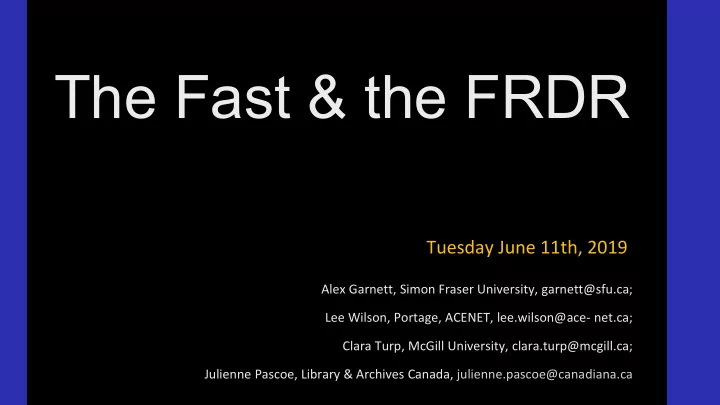

The Fast & the FRDR Tuesday June 11th, 2019 Alex Garnett, Simon Fraser University, garnett@sfu.ca; Lee Wilson, Portage, ACENET, lee.wilson@ace- net.ca; Clara Turp, McGill University, clara.turp@mcgill.ca; Julienne Pascoe, Library & Archives Canada, julienne.pascoe@canadiana.ca
Agenda Background information • Discovery and Metadata • • The Fast & the FRDR
Background
The Portage Network ● The Portage Network: Canadian Association of Research Libraries (CARL) ● Shared stewardship of research data in Canada ● Networks of experts and working groups ●
Portage Expert Groups ● Data Management Planning ● Curation ● Data Discovery ● Preservation ● Training ● Research Intelligence ● Data Repositories
Data Discovery Expert Group “The main purpose of the Data Discovery Expert Group (DDEG) is to support data creators and curators in planning, producing, and managing descriptive metadata to enable the effective discovery and reuse of research data across a wide range of disciplines.”
FRDR Discovery Service Working Group ● Federated Research Data Repository Partnership with Compute Canada ● 100 000 metadata records from over 40 repositories ● https://www.frdr.ca/repo/ ● ● FRDR Discovery Service Working Group Appropriate description and discoverability ● Discoverability for the widest audience ●
Discovery & Metadata
Discovery ● Discovery: research data to support new research ● The role of metadata ● FRDR as aggregation service
Harvested metadata ● Challenges in normalizing metadata ● Crosswalks built for standard fields ● Subject/Keywords
The Fast & the FRDR
FAST ● "Faceted Application of Subject Terminology" Derived from Library of Congress Subject Headings ● Maintained by OCLC ● ● Why did we choose FAST? Fairly widely implemented with a mature basis ● Sufficiently generic, wide-reach ● Good open APIs, potential for linked data ●
Open Refine ● Open source Google project ● Powerful for this use case: Messy dataset ○ Reconciliation service using open APIs ○ Using a semi-mediated process ○ https://github.com/cmharlow/fast-reconcile https://github.com/OpenRefine/OpenRefine/wiki/Reconciliation
Challenges & Next Steps
Challenges ● Large-Scale and ongoing work ● What about unmapped keywords? ● Integrating this work with the FRDR harvesting process?
Fast & FRDR W orking Group Define guidelines for mapping subject keywords that do not ● correspond directly with the FAST vocabulary Work collaboratively and asynchronously using OpenRefine to map ● subject keywords to FAST vocabulary Peer review mappings to ensure consistency and quality ● Develop a work plan for unmapped subject keywords ● ● Develop a work plan to ingest those mappings back into the repository and workflows to map new metadata harvests.
Discussion Points ● The Bilingual Canadian context Mapping French keywords (RVM) ○ ● Choosing policies and practices: Granularity: Royal canadian mounted police superannuaction account ○ Standardization ○ Abbreviations, names, numbers, multivalued data ○
Questions? Thank you!
Recommend
More recommend